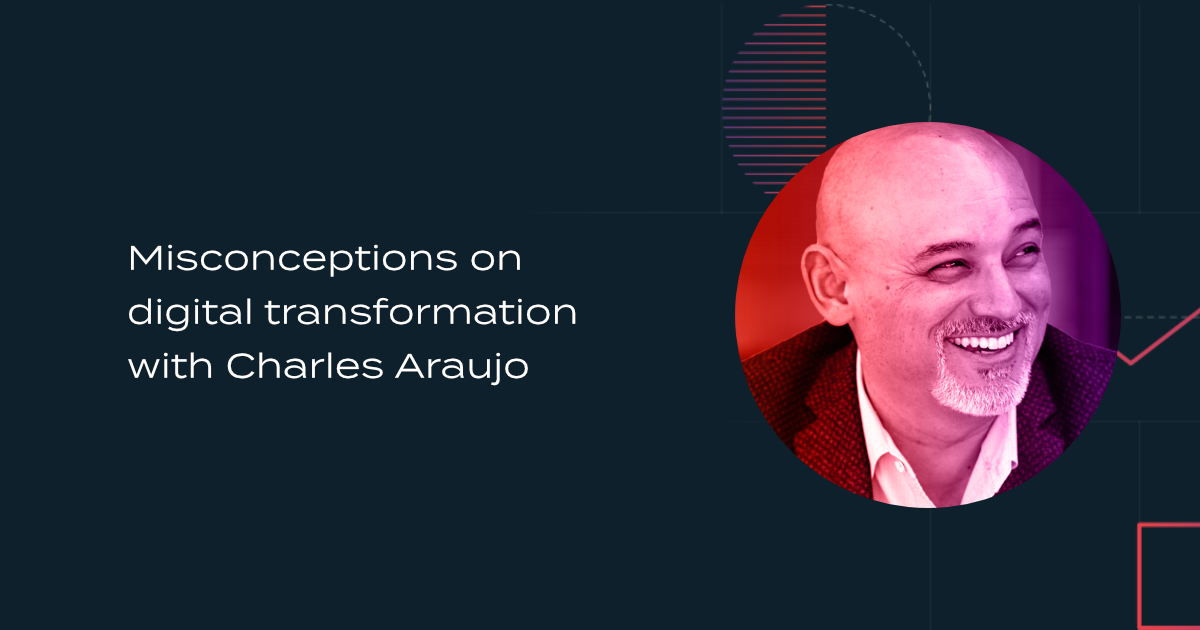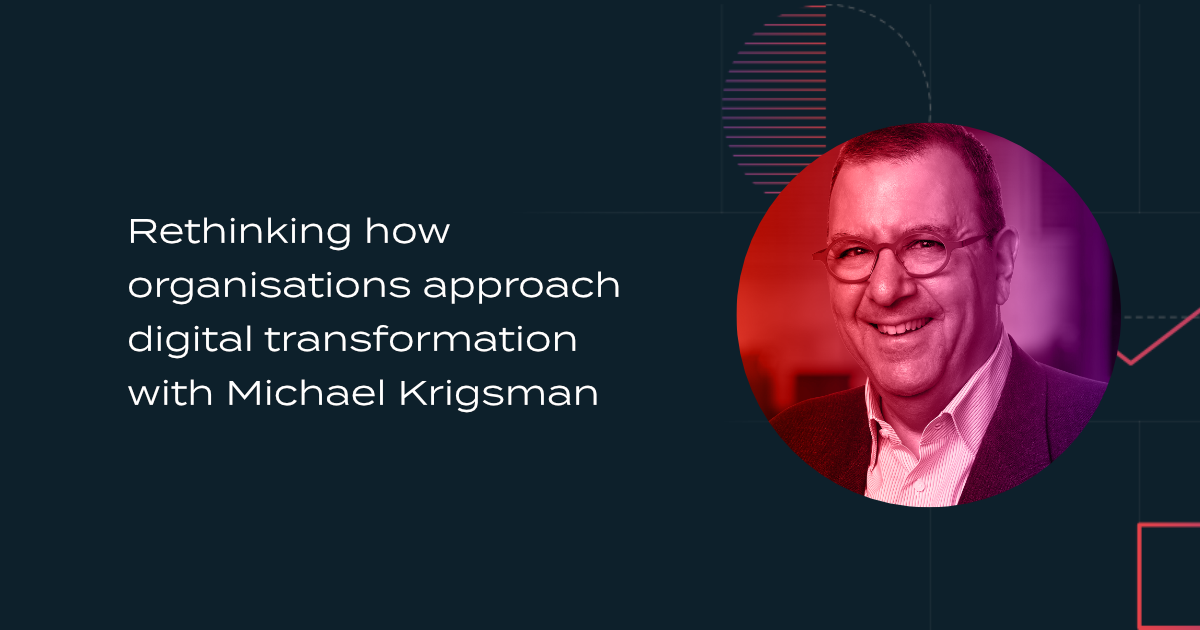
What does it take for a company to successfully drive their digital transformation projects forward?
In this round of cocktails, we talk to the founder of the Institute of Digital Transformation to explore the reason why 2020 was the “transformational year that wasn’t” and the challenges most companies face with their transformation initiatives.
He further gives us advice on how to achieve a state of readiness for transformation and how we can accelerate our journey by utilising the “Medici effect”. We also dive into why becoming a “tech company” shouldn’t necessarily be the transformation that companies should be aiming for.
Episode outline:
- Charles Araujo argues his stand on why 2020 was "the transfomational year that wasn't."
- How does one gain "intellectual curiosity"?
- What should our parameters look like to help redefine success towards digital transformation?
- Araujo explains to us the "Medici affect."
- How do successful organisations inculcate a change-oriented mindset, digital and technology literacy, and strategic thinking in their employees?
- Why do we fall into the trap of labeling and what should we be doing instead?
- What is the "tech company fallacy" and how does it affect our decision-making?
Transcript
Kevin Montalbo
Welcome to episode 49 of the Coding Over Cocktails podcast. My name is Kevin Montalbo. And joining us from Sydney, Australia is Toro Cloud CEO and founder, David Brown. Good day, David!
David Brown
Good day, Kevin!
Kevin Montalbo
All right. Our guest for today is a technology analyst and internationally recognized authority on the Digital Enterprise and Leadership in the Digital Era. Researching Digital Transformation for almost 10 years, he is now focused on helping leaders transform their organizations around the customer experience and to reimagine the future of work.
He is a Principal Analyst with Intellyx, founder of The Institute for Digital Transformation, co-founder of The MAPS Institute, and author of three books, our guest is a sought-after keynote speaker and advisor to technology companies and enterprise leaders.
Joining us today for a round of cocktails is Charles Araujo. Hi Charles, great to have you on the show!
Charles Araujo
Hi, Kevin! Hi, David! Great to be with you.
David Brown:
Good day, Charles.
Kevin Montalbo
So, you covered a lot of interesting topics about digital transformation in the Institute and in your blog, you described how 2020 was the transformational year that wasn't, which is quite contradictory to what most experts, even the ones who have been in this podcast have been saying about; how the pandemic became a catalyst to accelerate digital transformation. So, can you explain to us why you described the way you did?
Charles Araujo
Well first of all, thank you very much for making me read all my own articles. It's always great to go back down through memory lane. So, you know it's funny I was actually going through your list of past guests and I actually know a large number of them. So, you know, no disrespect to any of them. But yeah, I guess I have a slightly contrarian view. You know, what I wrote about in the article is that first of all, kudos. I've been in that seat of having to run IT organisations and speaking to a number of execs that are friends of mine. I know these were herculean efforts right? So, I'm not trying to diminish that by any stretch.
They were just doing crazy things to try to respond to this massive shutdown that just sort of hit all at once. But my point in the article was that what they were doing was responding, and that when we talk about what true digital transformation is all about, it's not about responding. It's not about this response per se to this acute thing that happens. What they were really doing was, there was pent up demand, there was all the stuff that they knew they should be doing, they knew they should be taking care of and this gave them an opportunity to do that.
And so they responded. They reacted. But my view and I think the real issue here is what do we mean by digital transformation? In my view, it's about a fundamental change in the business models and operating models of an enterprise to pivot around the creation of value derived from creating a differentiated customer experience. And if you look at most of what happened throughout the pandemic, that's not what was happening, that isn't at all what it was about. And so that's really the point of it. It was a mismatch of sort of what we mean.
And so what really people were saying is that there was, you know, seven years or 10 years of change that happened in a few months. Absolutely true. But the point of the article was that there was an opportunity. I believe there's still right today, an opportunity for true transformative action and efforts if people seize these moments.
David Brown
Yeah. And in the same article, you said that a lot of organisations missed the mark because they didn't have enough “intellectual curiosity'', which I thought was an interesting phrase. So, what does it mean? What is intellectual curiosity? And how does one get it?
Charles Araujo
Yeah. I wrote this article and I knew I was going to catch flak. Ironically, I didn't get as much as I thought. People just probably ignored me. But yeah, I give a lot of keynotes on creativity or I had right before the pandemic, that I started to really pivot around this. And the idea of “intellectual curiosity” is really just this idea of being introspective and mindful and being willing to challenge the status quo.
So, going back to the last question, a lot of what we saw was incremental change. It had been all bundled up and done really, really quickly in the short period of time, but most of it wasn't representing fundamental shifts in how things were done. And the reason is, you know, when you're under pressure like that, you don't have the luxury of doing that true transformation [which] requires this. You know what this idea of intellectual curiosity is: the step back, it's pausing and saying, “Okay, if we could start with a blank sheet of paper, how would we create this organisation? How would we create this business model? How would we create the operating model? How would we transform the way we interact with our customers and the way we deliver value and services to them?”
When I talk about intellectual curiosity, that's what I mean. It's being willing to do that. I know you asked how do you do it? But let me start by saying why it's so hard. It's so hard because our organisations aren't set up that way. That's not how we manage performance. It's not how we measure growth. That's all of those things. I had this executive that used to fly me out. I lived in California at the time, [they] fly me out to Ohio once a month to do “strategic planning.” And my fingers are doing air quotes here, for those listening. And I remember I was quite a bit younger at the time and I remember thinking, you know, how proud I was of myself that I was so smart that someone is willing to not only pay me but fly me across the country every month just to hear my thoughts.
Now, what I came to learn as I got older is that he couldn't put on his calendar, “time to think.” But he could put on his calendar, “strategic planning with Charlie.” And so my job was, I was the foil. I was the muse. I was the guy to walk around the lake so he could think out loud, so that he could embrace this idea of intellectual curiosity. He just stepped back to see what was really happening. It's really hard to do.
So, that is an example of a way of doing it. There's lots of ways, you know? Practicing mindfulness in general and applying it to your work life, new retreats done right can be an effective way of doing that. Anything that causes you to step back from the way things have always worked and giving yourself the space to say “what if”, “how could”? That's what intellectual curiosity is and that's how to start opening the door to it.
David Brown
Yeah. So, I guess your point is “the year that wasn't” was more about response to an emergency. And I guess a lot of it revolved around electronic communication both internally from members of the team members, as well as externally to customers and business partners.
And so [for] electronic communication, you starting to use Slack or Microsoft Teams is not necessarily digital transformation. “Click and collect” is not necessarily digital transformation. There may be some technologies which facilitate digital transformation but it goes way beyond that. It's a strategic thought process and it's holistic.
I think one of the interesting things you also mentioned is one of the barriers for digital transformation is actually starting, finding a starting point. You wrote an article on digital transformation not because it's easy, but because it's hard to tell us that the first step is to redefine success. So, what should the success parameters look like working towards transformation?
Charles Araujo
[Digital transformation] is not about creating a reference architecture that's locked in stone and we review it every two years.
Yeah. So, you know, you're right. If we look back at that and it was this idea of a response. And the point was it really wasn't about the technology. Any technology can be a vehicle for true transformation. It's really about what you do with it and that actually goes to this question. The point of that article actually, what spurred it - in fact, I quote the study in that article and in it, it was two staggering numbers.
This was a few years ago now, but one was at 30-some odd percent of the executives that they surveyed in the study had done nothing to prepare for digital disruption and I'm like, you know, mind blown. It's like, how can you not be doing anything with this endless drumbeat of everything being disrupted.
But the one that actually got me going much more, like just got my dander up, was the fact that 7% thought they were done. And what it really spoke to was the fact that people are just looking at the idea of digital transformation improperly, like it's a technology project. Like it is just something that has a start and a finish and these metrics in between. And in the article, I talked a lot about the fact that, you know, we as humans are wired that way, right? In fact as a writer, one of things we practice is this idea of the open loop, right? Because if you start a story and don't finish it, it drives humans crazy. We want to know how it's going to end. We hate that open endedness. Right?
And so when we talk about digital transformation, what makes it so hard is by its very nature, it's a process. It's not a project. It's a journey and it doesn't, at least for the foreseeable future, it doesn't have an end per se because what it's really about is building a capability of continuous change, right? At least as I look forward, putting on my futurist or analyst hat, I look at where things are going over the next 10 or 20 years and I know this makes me a pretty crappy futurist, but I have no flipping clue what's going to happen. The only thing I'm sure of is that it's going to look a whole heck of a lot different than it does today, that things are changing so rapidly that if we try to stick a pin in it, by the time you get wherever the heck you thought you were going, there's a good chance that the entire landscape looks entirely different than what you imagined it to be.
So, the redefining of success means stop trying to approach this with industrial age patterns and measures and instead focus on the capabilities that you need to create an agile organisation - one that is capable of continuous adaptation, continuous change, continuous pivoting because that's what's going to be necessary when we have an uncertain future, when we don't know what's coming. Then you need to be building the controls and capabilities that allow you to adapt to whatever comes and technology plays a huge, huge role in that, right? You know, architectural elements are foundational here. But again, we have to approach it from the right perspective because it's not about creating a reference architecture that's locked in stone and we review it every two years, right? It's about creating a highly agile and adaptable architecture from a technology perspective that gives our business counterparts the flexibility to do whatever they need to do. Right?
And so it's this really fundamental shift, I think, and how we look at what it even means to digitally transform. You mentioned one of the groups that I founded, it was the Institute for Digital Transformation and we built something called the Digital Enterprise Readiness Framework to try to instill this idea for people to say that it's really about maintaining the state of readiness, right? And that's what we actually need to be measuring. Are you in fact ready to adapt? And I know I've been talking too long on this one, but my last little bit on it is to think of it like an elite sports team. They have drills, they've got plays, but what they're really practicing is how to work together, how to communicate, right? A team that cannot adjust on the fly, do an audible if you're a US football fan right? Now see, the lay of the land can change the play on the fly. The team that can't do that loses every time. The teams that can do that effectively have a much higher chance of winning. That's what we're talking about when we talk about true digital transformation.
David Brown
That's interesting. You mentioned that framework you developed at the MAPS Institute [sic] presumably several years ago. Are you still finding the same framework relevant today? Did you have to tweak it, modify it?
Charles Araujo
Unfortunately, no. The state hasn't changed much and in a sort of weird, ironic twist, I think the pandemic actually set this back. We saw a massive forward progression and a lot of migration to the cloud, as an example. Right? So, a lot of technology transformation but not nearly the business model kind of transformation and that cultural transformation that we're talking about. And I think that's where the big opportunity still lies.
So, no, I don't think so. And the reality is that even if organisations had fully grasped this and fully adopted it, it's the same thing. You don't achieve a state of readiness and then you're ready. It's a continual thing. It's like after you win the Super Bowl, what do you do? Show up on Monday and you go to practice again, right? And you start practicing again. You have new teams, new plays, you've got to stay sharp. It's really the same thing here.
David Brown:
We're talking a lot about intellectual curiosity and thought processes and approaches to digital transformation. And one of the things I thought was interesting is you've written about a concept called the “Medici Effect” to promote thought diversity because we want to have a creative process here. And my understanding is you have observed this in action, this Medici Effect. Can you tell us about it?
Charles Araujo
Yeah, so I wish this is my idea. It's not. It's a brilliant concept coined actually from a book by a gentleman, by the name of Frans - I hope I'm saying his name right - Johansson, I think. Anyway, he has a group called the Medici Group. It's actually “Me-dici.” I've been saying it wrong for years. And then if you don't know, the Medici family is an extremely famous family from history. They ruled Florence in the middle of Italy for hundreds of years and there's all of this kind of lore. I actually have a - well I guess a personal connection is too big of a term - but I spent five weeks living and working just outside of Florence two years ago. And so I sort of, you know, got a great opportunity to spend quality time in a lot of these Medici outposts, in the history, kind of feeling it.
But one of the things that is interesting about them is they were a powerful family. They were arguably one of the world's first modern bankers, but they also were huge patrons of the arts. And the point of this, Johansson's book, was that they unintentionally and inadvertently kicked off the Renaissance by bringing together the best Italian artists from all over Italy into Florence because they wanted the best art. They wanted the most beautiful, most avant garde art. And so they brought all these people together and once they brought all these artists together, it created this explosion and creativity because they were feeding off one another. They were watching each other's techniques and viewpoints and perspectives and it caused them all to grow because each of these were sort of at the peak of their own little areas of Italy.
And so they didn't have anyone to learn from or to grow from or not as easily. And now suddenly they're all in one place and they're all feeding off one another. And it created this explosion in art that, you know, I think was only part of it, but eventually blew up into what we now think of, or know as the renaissance.
And so the point of the book is that this isn't a one off thing, that this is a very well-known example. But we actually see this throughout history and in modern times of what he ends up calling the “Medici Effect,” this idea that you bring people together with different ideas, perspectives, thoughts, backgrounds and allow them to be in a space virtually or physically that they feed off one another. And we see explosions of creativity.
And so what you're referring to is that I actually gave a keynote at a place called KAUST, the King Abdullah University of Science and Technology in Saudi Arabia. And it was this strange place in a very cool way because they brought people in from all over the world, some of the smartest minds around the world in all of these different areas, kind of exploring science and technology.
You know, Saudi Arabia has some repressive and oppressive sort of policies and within the walls of KAUST they all but were gone. It's like they very intentionally created the space that was like the safe wall and literally walled off. It was like you had to pass through three security checkpoints to get in. It was this little enclave that was really for all intensive purposes, not part of Saudi Arabia in terms of like all the rules and what have you. And so it was this amazing experience because imagine some of the smartest people in the world, all in one place, all interacting and so they're still producing just massive amounts of technology coming out of it.
And so that's the idea. So, my call in that article and certainly any chance I get is to tell people that they have the opportunity to do something similar within their own walls, to purposely bring people with different perspectives and ideas and viewpoints and backgrounds and histories and certainly, you know, diversity sexually and or by gender and raised right. And just stick them together and see what happens.
I think, you know, going back to intellectual curiosity, it's a hugely important way or beneficial way of doing that, righ? Because you just sort of let it go and let people have the freedom to explore and ask the “what ifs” and “why nots” and “how tos” and some amazing things can happen.
David Brown
You mentioned that according to a study at MIT Sloan Management review, the three most important employee skills needed during a digital transformation are a “change orientated mindset, digital and technology literacy and strategic thinking.” How can an organisation develop those skills?
Charles Araujo
So yeah, I thought you were going to ask how our organisation is doing it. And the sad answer is that they’re not for the most part.
David Brown
That’s interesting. Your observation is not actually happening at the moment.
Charles Araujo
You know, again, I think there are some organisations that are but the hard part with these kinds of skills is that it requires an executive team that understands their importance and is willing to invest in them. And because it's not like training someone in, you know, React or something right? Where it's like, there's a very demonstrable connection between that and an output that I'm trying to create. These are difficult to quantify and so, making investments in them.
And the hard part is these are long term investments, creating a change or change-oriented mindset, creating this strategic thinking kind of critical thinking approaches, adopting things like system-thinking and design-thinking. These take a long time. These are fundamental shifts in change in thought patterns and so, these are big investments. So, here's where I’ve seen, you know, some success with organisations doing a few things like one organisation did a “Shark Tank” like program where they had a specific program in place where it's formal and they made it lots of fun, modeled off the TV show “Shark Tank.”
And it was looking for innovative ideas and and basically, if you formed a team, you had to present your basic pitch and all it was looking for is this was for real, that it wasn't like some, you know, “Hey we want to go to the Bahamas and test sand or something,” right? And as long as it was a real thing, then you got allocated time to work on it and a little bit of budget and then you’ve got to come and make your pitch to the “shark tank” and it was the shark tank with executives. And those that won the shark tank actually got funding and the right to go and try to bring their idea to market within this company.
And I think that was a great idea, right? It encouraged teamwork and encouraged this whole cultural shift of people thinking about innovative ideas and if you think of the old fashioned suggestion box, it was the complete antithesis of that right? Rather than just writing some idea and sticking in the black void, it was you having the opportunity to build it out and make your pitch and make your presentation and if we like it, we’ll fund it, right?
I think that there have been examples. Directv, before they got acquired, had a team of people whose whole job was to help ferret out ideas and to partner with business units to bring them to fruition. The US Government, actually the office of the White House under the Trump administration, I believe it's still functioning under the Biden administration, has a tiger team. They have some of the brightest minds that they stole away from Silicon Valley and they send them out to federal agencies and their whole job is to help them build out innovation mindsets and to bring innovations to market.
I think there's examples of it, right? But every one of these, if you sit and process what I said for a minute, these are massive investments. This isn't just a little thing. And so, because of that, I think that most organisations have shied away from it and they aren't investing and the sad part is it doesn't need to be that big a grand scale, all right? It can be something on a much smaller team level, something as simple as Google's famous - they've now disbanded I believe - but they used to have [a] “10% of your time was allowed to work on anything you wanted” kind of approach. You know, I think there's a lot of simple things that you can do even at a team level to do it. But sadly, I don't think most organisations are really making any serious consistent investments in these areas.
David Brown
Yeah. The reason I ask the questions is we often hear from our guests that one of the biggest challenges associated with digital transformation is rolling out process change and getting people to innovate with new ideas and being accepted. And so, if that's the biggest inhibitor for a digital transformation process, then it makes sense that a strategic thinking and changed-minds, orientated mindsets are the way to go before rolling out these changes. But it's easier said than done because those are enormous challenges.
Charles Araujo
And you know, I'd almost argue that a transformation program can, in fact, be a fabulous tool to drive cultural transformation and to build these skills and I'll give an example. So, in my previous life I used to run large-scale transformation programs and I had a few rules when I did this. The first was that we created a vision statement first, right? This wasn't about a project plan. We started with a vision of the future of what we're trying to create through this transformation. What did a transformed organisation look like? We created what I call the “Why this? Why now?” statement.
And it was this call to action, why we had to do this and why we had to do this right now. And it was an invitation to have everyone see themselves in that vision. In fact, the process to create it was one of the largest processes at the beginning of this launch where we would bring together massive numbers of people from the prospective teams to help craft this vision. It was incredibly laborious, but the end state was that we had a vision statement that wasn't being thrust upon people, that people had invested in helping to create.
And then once we did that, we created a whole series of cross-functional, transformational teams. And my rule was every team had to be led by an individual contributor. No managers, no directors. It had to be led by an individual contributor because that was how we were going to start building talent right? So any manager or director who had people that they had their eye on as the people they saw potential in and they were given these slots and now and it was fascinating because their managers and directors were sometimes on their teams.
And in the context of these transformational programs, they were the ones in charge and they weren't making decisions. You know, there wasn't any mandate here to say, “Hey, you get to go decide.” They had to get the team on board. They had to convince [them] so all of these things we're talking about were embedded in the process itself. And because it was part of a finite transformational program with a definitive set of objectives, it gave it boundaries and it gave a safe space for people to operate.
And so when we did that, it actually created, in fact, one of my crowning achievements, so to speak. In one of these programs, I think we had five of the six team leaders of this one group all get poached to go become management leads in non IT units. It was really fascinating because the business people that they were interacting with said, “Wow, we love what this is. We love that you understand that,” because we forced them to understand more about the business and they were getting pushed out of it.
So you know, I think it became this thing where we were propagating these transformational skills ironically enough using a transformational program to do it. So, I think that is one way of driving it, but there's lots and lots of ways.
David Brown
Yes, I think there's an opportunity for a book here. These anecdotes are really, really useful and interesting because the companies do need to develop these strategies and learning from what has worked for other organisations is, I think, enormously valuable.
Can we talk about acronyms and buzzwords? The IT industry loves them and you've argued that by ignoring labels, we'd often lead to more success. Can you tell us why we always fall into this trap of labeling and what we should be doing instead?
Charles Araujo
So, I think this applies in a lot of ways. My wife's family is famous for giving nicknames, but I think it's a human condition. We have to process massive amounts of information and so we have to create associations, and labels are a simple way of doing that. There's nothing inherently wrong with that. I pointed out that in the article and I rail on this one all the time as an analyst, as an analyst firm in particular.
But the industry, at large, loves to create these nice, neat little boxes that they can stick tech companies into so that they can compare them and blah blah blah and you know, I'm old enough now that 20 years ago, the technology landscape was fairly static. It didn't move that quickly. So, it was actually really useful. If you were going to go by piece of technology, there was guaranteed to be three or four direct competitors, stick them in a box, doing a feature set comparison, doing a bake off all made perfect sense.
Today, at least for those organisations that are doing anything, the least bit disruptive that are doing anything about pushing boundaries, that is the absolute worst thing you could do because there is no direct comparison and there's no neat little box. And I know we're probably not supposed to be talking about you guys directly that much, but Toro is a great example of this, right? I don't know what box I'd stick you in if I was forced to stick you in a box right now, right? And almost any company that I find interesting that's doing interesting stuff falls exactly into that trap, that there is no way to just pick a box and neatly stick you into it.
And so, to me, I understand why it happens. I certainly understand why the large analyst companies or firms do it. But as an enterprise leader, because that's what I am at my core, it's the exact opposite thing that enterprise executives and leaders need today because the fundamental situation for them is that they have business problems to solve. And it doesn't matter if I call you an “integration company” or a “low-code development platform.” It doesn't matter what I call you. The only question that matters is here, my very unique problems here, the very unique outcomes I'm trying to achieve in my transformative goals. Can you help me? Can you be a part of that solution?
And the reality is even if you can be, you're not going to be the whole solution. There is nobody out there, even the biggest tech companies in the world, that can deliver a complete solution with nothing else required. So, for the enterprise leader, it's about how do you assemble the winning all-star team, right? If we go back to the sports analogies, I need to assemble the winning all-star team and no matter what, I'm going to have a whole bunch of players and if I try to stick labels on all of them, it's just not going to work. I'm going to end up sending myself down these rat holes of comparison. In fact, I wrote another piece called “Distinction Bias” that when you start comparing two vendors or two anything head-to-head, you start overweighting the differences between those two.
So, I look at these two because I'm trying to compare. I say, “Well this one has 5% more of that one. That must be better,” right? When I'm actually looking at the context of my business problem, that 5% probably doesn't mean anything at all. But the distinction bias creates an overweight. When I look at those differences, I overweight them because I'm actively looking at this and trying to compare and there's all this neuroscience that goes back to this in terms of the way our brain works when we're focusing on something and that's what happens. We're creating this false focus when we're sticking labels on organisations.
So, sorry, I'm probably ranting a bit, but it just really bugs me because I think it is completely the antithesis of what enterprise leaders need. And so I think we just want to eliminate them as much as we possibly can.
David Brown
Yeah, I don't think you're ranting or raving at all. I love this thought process that we're discussing because it's so critical. You've also written that digital transformation is stirring a debate as to whether the process of digital transformation, is it overly hyped or is it actually understated, severely understated? And you came up with this term, the “tech company fallacy.” Can you explain what the tech company fallacy is and how it affects our decision making?
Charles Araujo
Don't ever lose sight of what you're actually doing in business; and that is to provide value to your customers.
You were quite obviously trying to get me to rant and rave all over this show because this is another one of my bugaboo ones. So, there have been a number. In fact, I probably should look to see who said it first, but somebody had this quote: “Every company is now a tech company.” And so the tech company fallacy is simply that, that the people bought this googly gunk that every company is in fact a tech company.
When I said it's both overhyped and understated, what I mean is that on the one hand, it's hard to go to a tech company website today and not find somebody talking about how they're essential to digital transformation. It just becomes this meaningless term now that people are slapping on everything. And rightfully so, most enterprise leaders kind of just roll our eyes at that because I advise tech companies. I say it's been neutered to the point that it doesn't add much value. You need to be talking about specific outcomes, specific business value challenges that you're helping to address.
But on the other side of the coin, I think because of that, maybe even most organisations are still not truly grasping the essence of what digital transformation should really be. And I think that the tech company fallacy has almost become a form of bias because they seem to think that that's actually it, by saying, “We're a tech company. We don't sell cars. We’re a tech company that happens to sell cars,” then they're sort of creating this false relationship, and somehow thinking that that means they're digitally transforming themselves when in fact it's entirely missing the point.
So, by my definition, the only true tech companies are companies whose entire business is selling technology and by definition, I need to then use that technology to solve a business problem for my customer. So, if I'm using that technology to solve a business problem for my customer, I'm not a tech company. I’m a whatever-it-is company because we all provide value. Any company in existence has a set of customers and they exist to do one thing: to provide value to those customers. And today, the competitive differentiator is the experience I provide to them in the form of that value.
So, the question is how am I leveraging technology to do that? So, to the degree that what people mean when they say we're a tech company that does XYZ, to the degree that when they say that they mean that they're using technology and support of delivering that value, then I'm all on board with that. My concern is that isn't what most of them think. Most of them drank the Silicon Valley Kool Aid and they think that to be cool, to be valued on the market, they have to act like Google or they need to seem like they're Amazon and it misses the point because those companies exist to sell technology to them, right? That company, any company that isn't a tech company exists to sell to deliver value in some other form to their customers.
And so, the best technology in that scenario is one that I stopped to even realize is a technology, that it just becomes ubiquitous. It's this ambient technology and this idea that the technology becomes so fluid, so immersive that is just part of the ambient nature around me in the experience. And ironically enough. Amazon is a classic case of this right there. Their new stores where they're fully automated, where you walk in and they know who you are, you grab your stuff and you walk out. That's an example where I'm not interacting with the technology at all.
It’s the technology that is driving a transformed experience. And so what the organisation should be looking at is, “How can I create value in the form of an experience of the customer that just blows away my competition?” And unquestionably, technology will underpin that. It will be based on the ability to leverage technology.
And so, adopting some of the ethics of tech companies in terms of being fast to market, minimum viable products, all those kinds of things, [that’s] great, as a way of doing that. But don't ever lose sight of what you're actually doing in business and that is to provide value to your customers. If you lose sight of that, it's lost. And so, that's why I kind of rail against this tech company fallacy because it takes their eye off the ball. It takes the eye off of what they're really should be focused on.
The only true tech companies are companies whose entire business is selling technology.
David Brown
Charles. It's always a pleasure to talk to you. You're so easy to talk to, you have such great ideas and are so passionate about it. How can our listeners follow you on social media and your blogs?
Charles Araujo
I'm pretty easy, “Charles Araujo.” A-r-a-u-j-o dot com is the website. I'm “@charlesaraujo” on Twitter. I'm “Author Charles Araujo” on Facebook and Instagram and I'm “Charles Araujo,” I'm pretty sure on Linkedin. I'm really easy. As long as you can spell my last name, you can find me.
David Brown
Thanks for your time today, Charles.
Charles Araujo
Absolutely, great being with you.
Show notes:
- Institute for Digital Transformation
- A Unique Moment for Transformation by Charles Araujo
- Digital Transformation: Not Because It's Easy, But Because It's Hard by Charles Araujo
- “Accelerating digital transformation using the Medici Effect” by Charles Araujo
- Charles Araujo on LinkedIn
- Charles Araujo on Twitter











